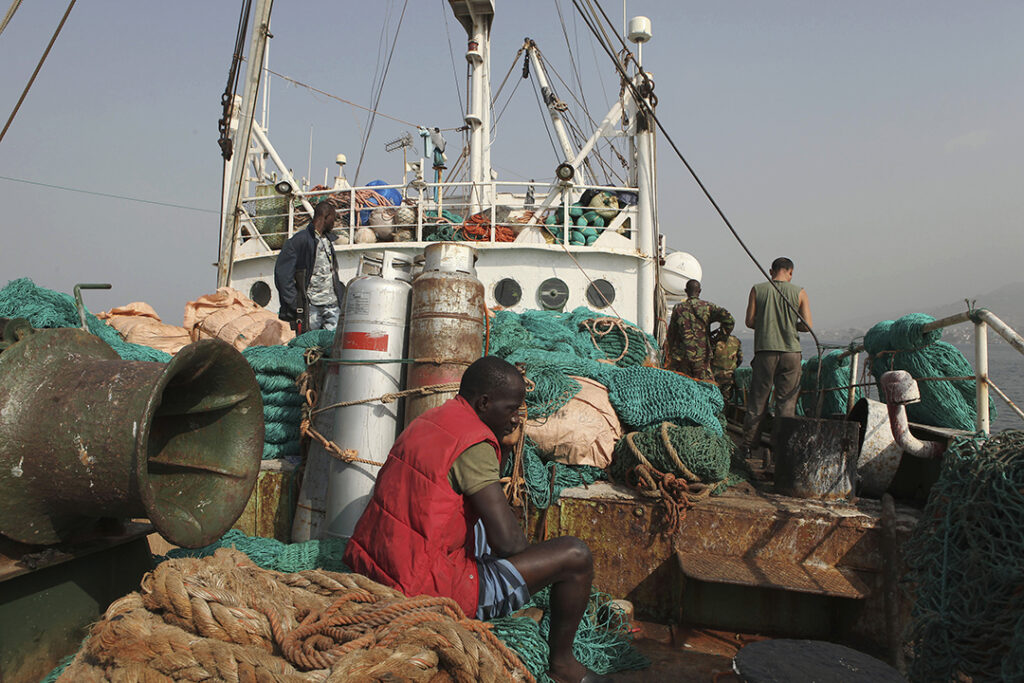ADF STAFF
Illegal, unreported and unregulated (IUU) fishing continues to rob the Gulf of Guinea of precious fish stocks and threatens the marine ecosystems necessary for their survival.
Maj. Gen. Richard Addo Gyane, commandant of the Kofi Annan International Peacekeeping Training Centre in Ghana, made his frustration with the situation clear during a maritime security conference in late November.
About 5 million people in the region depend on fisheries for food and income, but for decades industrial and semi-industrial foreign trawlers, mostly Chinese, have targeted Gulf of Guinea fish.
The trawlers are known to use illegal gear, fish in prohibited areas, underreport their catch, and disguise their true owners to avoid penalties and fines. In Ghana, for example, illegal fishing vessels fly Ghanaian flags, but 90% of the trawlers are owned by Chinese companies, according to the Environmental Justice Foundation (EJF).
Gyane called for a holistic approach to combat the scourge.
“Sustainable development of the blue economy, improvement of the well-being of coastal communities and commitment and collaboration across agencies and governments are key in reducing maritime insecurity in the Gulf of Guinea,” Gyane said in a GhanaWeb report.
A new report by the Financial Transparency Coalition showed that West Africa has become the world’s epicenter for illegal fishing, as 40% of it occurs there. The region loses at least $2 billion annually to IUU fishing.
In areas such as Ghana, overfishing and illegal fishing have driven fish stocks to the brink of collapse. Small pelagic fish populations, such as sardinella, have dropped 80% in the past two decades. One species, sardinella aurita, is fully collapsed, according to the EJF. IUU fishing also is linked to other sea crimes, such as piracy, human trafficking and drug smuggling.
During the maritime security conference, Thomas Mandrup, an associate professor at the University of Stellenbosch in South Africa, said it is imperative that Gulf of Guinea nations design and align strategies to protect their maritime interests, GhanaWeb reported.
This year, Benin, Ghana and Togo agreed to joint patrols and sharing of information with support from the European Fisheries Control Agency.
Still, artisanal fishermen in Benin continued struggling in December.
Fisherman Geoffroy Gbedevi told Voice of America (VOA) that it’s getting harder to feed his pregnant wife and daughter and that his entire community is suffering. There simply aren’t enough fish left to catch.
“Nothing is going the way it used to,” Gbedevi told VOA.
Near Benin’s border with Togo, community leader Yaya Toshu Koma Benoit said scores of people have moved away to find work. Benoit said part of the problem is that illegal fishing vessels often catch juvenile fish.
“That’s why there are no more fish,” Benoit old VOA. “If we can ban this practice, that’s good. There are lots of fishermen who use smaller mesh nets, so there are not many fish left.”
Susan Steele, executive director of the European Fisheries Control Agency, acknowledged that more efforts are needed.
“Legislation, operations, training and cooperation,” Steele told VOA. “One of the key things you want to be looking for is to make sure there are consequences for the people doing illegal fishing.”

